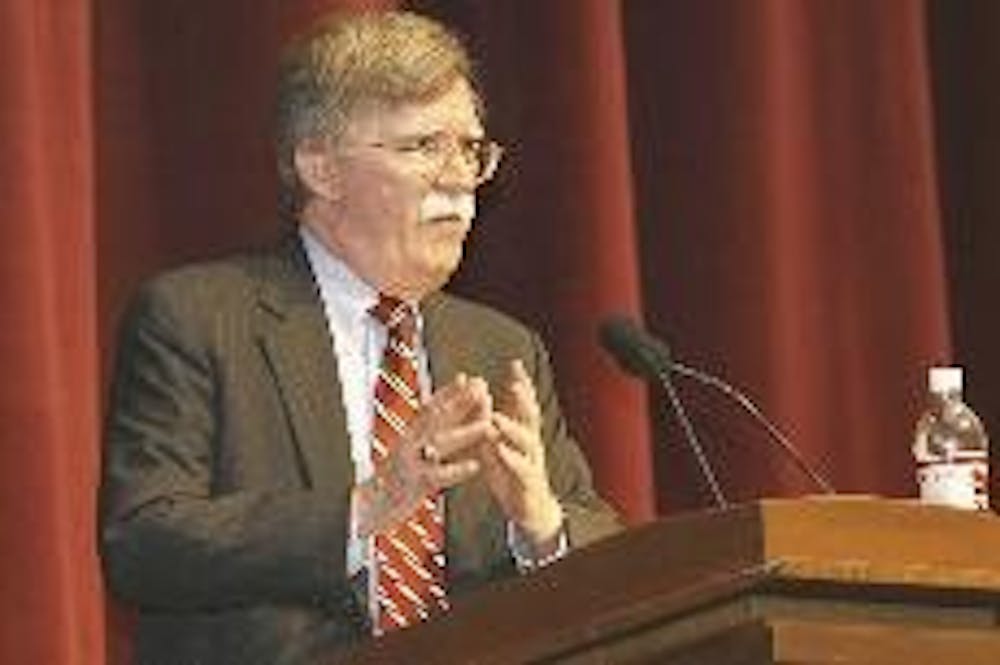
Controversial speaker, John Bolton, comments on North Korea and the nuclear arms race in his speech Tuesday night in Hall Auditorium.
Former U.S. ambassador John Bolton spoke about the future of American security Tuesday night at Hall Auditorium - while entirely avoiding the topic of the conflict in Iraq.
Brought to Miami University as part of College Republican's Conservative Week, the former diplomat to the United Nations made a point to say that he was not going to be speaking about Iraq, because the history books will show that the real enemies of this decade were Iran and North Korea.
After being introduced by controversial Butler County Sheriff Richard Jones, Bolton began to outline the danger of North Korea.
He claimed that Kim Jong-il has created a criminal enterprise of arms dealing, counterfeiting American currency, trafficked narcotics and owned a large stake of the illegal gambling industry in Japan. Bolton added that what is most troubling to the United States is North Korea's obsession with obtaining nuclear arms.
According to Bolton, it is difficult for the United States to find supporters in northeast Asia.
"I believe China doesn't want North Korea to have nuclear weapons," Bolton said.
He added that China is afraid to act, fearing that if the North Korean government were to fall it would make the region unstable and this would be counterproductive to China's economic ambitions. The ambassador said China may also fear the possibility of foreign troops on the Yalu River, the river separating China's border from North Korea.
Multiple times during his speech Bolton referred to North Korea as a 17-million-person prison camp, citing the country is the only place where the average height and weight of their citizens is in decline.
Bolton stressed that Korea needs to be a united democratic state.
"That is the only way we will be safe from North Korea," he said. "Time is not on our side."
Enjoy what you're reading?
Signup for our newsletter
However, Bolton said that North Korea was not the only security concern for the United States.
Iran has wanted nuclear weapons for more than 20 years, according to Bolton. Iranian President Mahmoud Ahmadinejad claims the country is solely developing nuclear energy, not weapons.
"It's just fanciful to think that what (Iran is) doing in the nuclear field is for peaceful uses," Bolton said in a press conference in Hall Auditorium before the speech.
He went on to say that the U.S. Department of Energy reported that Iran's natural gas won't run out for another 350 to 400 years, so the country does not necessarily need to seek other sources of energy. He also claimed that Iranian documents have been found showing how to make parts solely used for nuclear weaponry.
The former ambassador said diplomacy is not working in Iran. The U.N. Security Council has given Tehran several 60-day ultimatums, all of which have passed without repercussions for Ahmadinejad.
Bolton said the diplomatic pressures of the United Nations, European Union and United States on Iran have all resulted in Iran telling them to "take a hike."
"Iran couldn't care less about the U.N. Security Council," he said.
Bolton made his opinion on the United Nations clear, saying that the organizations power is derived solely from its recognition globally.
"The United States remains the greatest force for world peace and world liberty," Bolton said. "The United Nations has no legitimacy other then what their member governments give them."
On the issue of Iran's government holding British sailors hostage last month, Bolton emphasized that giving an inch on such an issue could lead to a mile down the road.
"(Iran's recent) hostage crisis was a low-cost experiment to probe the British to see what would happen, and the answer was not very much," Bolton said.
Sophomore accounting and political science major Jonathan McNabb said Bolton's speech made him think about the role of the United States in foreign affairs.
"One of the key points I derived from the speech was that the United States must focus more on the international arena," he said. "We need to have a stronger force of diplomats who are more willing to sit down and talk with nations all across the world."
Iran's foreign ministry has called Bolton "rude" and "undiplomatic," according to the BBC, and North Korea has called him "human scum."
The former ambassador responded to these phrases in a question and answer session by saying, "That's one reason that people with my views need to be on campus, to try to explain exactly what our policies are."
Sophomore business economics major, Kurt Grimes, felt that although Bolton has been advertised as a controversial speaker, Tuesday night proved to be not the night for controversy.
"Bolton strayed away from controversy," Grimes said. "The flyer led me to believe that he was going to be speaking more on the U.N. His speech was really informative, but I thought there would have been more controversy."




